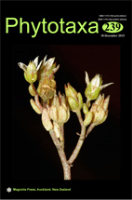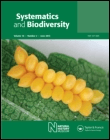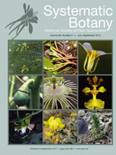
Phytotaxa
Scope & Guideline
Unveiling the Secrets of Plant Systematics
Introduction
Aims and Scopes
- Taxonomy and Systematics:
The journal emphasizes the classification, description, and identification of new species across various plant and fungal groups, providing detailed morphological and molecular data. - Biodiversity Conservation:
Phytotaxa contributes to the understanding of biodiversity and conservation efforts by documenting new species and providing taxonomic clarity, which is essential for effective conservation strategies. - Nomenclature and Typification:
The journal publishes nomenclatural notes and typifications to clarify taxonomic ambiguities, ensuring that scientific names are accurately applied and understood. - Phylogenetics and Evolutionary Studies:
Many articles incorporate phylogenetic analyses to explore evolutionary relationships, aiding in the understanding of the evolutionary history of taxa. - Regional Flora Studies:
Phytotaxa frequently includes studies focused on the flora of specific regions, contributing to the knowledge of local biodiversity and guiding conservation efforts.
Trending and Emerging
- Molecular Techniques in Taxonomy:
There is an increasing use of molecular techniques, including DNA sequencing, in taxonomic studies, enhancing the accuracy of species identification and phylogenetic analyses. - Endemism and Conservation Biology:
Research focusing on endemic species and their conservation status has gained prominence, reflecting a growing awareness of biodiversity loss and the need for targeted conservation efforts. - Urban and Anthropogenic Impacts on Biodiversity:
Studies examining the effects of urbanization and anthropogenic activities on plant and fungal diversity are becoming more common, highlighting the relevance of taxonomy in applied ecology. - Citizen Science Contributions:
The involvement of citizen science in biodiversity assessments is emerging, with studies leveraging public contributions to document species distributions and discoveries. - Cryptic Species and Species Complexes:
Research on cryptic species and complex species groups is on the rise, emphasizing the need for detailed taxonomic work to uncover hidden diversity.
Declining or Waning
- General Flora Surveys:
There has been a noticeable decrease in broad flora surveys as researchers focus more on specific taxa or regions, leading to a shift towards more targeted studies. - Historical Taxonomic Reviews:
The publication of historical taxonomic reviews has diminished, possibly due to a preference for novel species descriptions and contemporary studies that directly impact biodiversity conservation. - Non-vascular Plant Studies:
Research on non-vascular plants, such as certain bryophytes, has become less frequent, as the journal's focus shifts towards more prominent vascular plant groups. - Fungal Taxonomy Outside Basidiomycota and Ascomycota:
Taxonomic work focusing on lesser-known fungal groups outside the main Basidiomycota and Ascomycota has decreased, indicating a narrowing of focus on more mainstream fungal classifications.
Similar Journals

SYSTEMATICS AND BIODIVERSITY
Advancing the frontiers of ecological and evolutionary research.Systematics and Biodiversity, published by Taylor & Francis Ltd, is a prominent academic journal that provides a vital platform for advancing research in the fields of ecology, evolution, and plant science. With an ISSN of 1477-2000 and an E-ISSN of 1478-0933, the journal has established itself as a reputable source of scholarly information since its inception in 2003, and continues to publish cutting-edge studies through 2024. Recognized for its rigorous peer-review process, it holds a prestigious position in academic circles, reflected by its Q2 ranking in Ecology, Evolution, Behavior and Systematics and Q1 ranking in Plant Science as of 2023. The journal's contributions are further characterized by its strong performance in Scopus rankings, placing it in the 69th and 68th percentiles in its respective categories. Researchers, professionals, and students alike will find invaluable insights and innovative methodologies within its pages, making Systematics and Biodiversity an essential resource for those dedicated to understanding the complexities of biological diversity and systematics. The journal's impact factors and commitment to high-quality research underscore its significance in shaping the future of ecological and botanical studies.

RAFFLES BULLETIN OF ZOOLOGY
Bridging Knowledge Gaps in Zoology and EcologyRaffles Bulletin of Zoology, published by the National University of Singapore's Lee Kong Chian Natural History Museum, serves as a prestigious platform for the dissemination of cutting-edge research in Animal Science and Zoology, as well as Ecology, Evolution, Behavior and Systematics. With a current impact factor reflective of its Q2 category in both fields, this journal not only enhances its visibility in the academic community but also provides valuable insights into the complexities of biodiversity and conservation efforts. Covering a wide array of topics, Raffles Bulletin facilitates interdisciplinary collaboration and serves as an essential resource for researchers, professionals, and students alike. It is indexed in Scopus, ranking #233 out of 490 in Animal Science and Zoology and #406 out of 721 in Ecology, ensuring that the research published contributes significantly to the global discourse on wildlife and ecosystem management. Since its inception in 1996, this journal has bridged gaps in knowledge and continues to foster a deeper understanding of the living world.

ARTHROPODA SELECTA
Advancing the frontiers of arthropod research.ARTHROPODA SELECTA is a prestigious journal dedicated to advancing the field of Ecology, Evolution, Behavior, and Systematics with a specific focus on arthropods, published by KMK Scientific Press Ltd in collaboration with Moscow State University. This journal, issued under the ISSN 0136-006X, has established its significance in the academic community by consistently providing high-quality research articles and reviews that contribute to our understanding of arthropod diversity and ecological significance. As evidenced by its classification in the Q2 quartile in both Ecology, Evolution, Behavior and Systematics and Insect Science categories as of 2023, ARTHROPODA SELECTA stands out for its rigorous peer-review process and impactful contributions to the field. Although it currently does not offer an open-access model, the journal ensures a broad dissemination of knowledge to researchers, professionals, and students alike. With a commitment to bridging gaps in existing literature and fostering interdisciplinary dialogue, ARTHROPODA SELECTA is a vital resource for anyone interested in the diverse and dynamic world of arthropods.

NEW ZEALAND JOURNAL OF BOTANY
Advancing Knowledge in New Zealand's Botanical LandscapeThe New Zealand Journal of Botany, published by the esteemed Taylor & Francis Ltd, serves as a pivotal platform for disseminating significant research in the fields of Ecology, Evolution, Behavior and Systematics, as well as Plant Science. With a rich history dating back to 1963 and an impressive convergence extending to 2024, this journal has established itself as an essential resource for researchers and professionals dedicated to understanding the complexities of plant life and ecological systems in New Zealand and beyond. The journal is currently categorized in the Q3 quartile for both relevant disciplines as of 2023, reflecting its balanced influence within the global academic community. Although not an open access journal, it retains a significant impact factor, evidenced by its Scopus rankings, which place it within the top half of its categories. This makes it an invaluable tool for students, researchers, and academics aiming to engage with robust, peer-reviewed scientific findings and contribute to the evolving discourse surrounding botany and ecological research.

INSECT SYSTEMATICS & EVOLUTION
Empowering Research Through Open Access InsightsINSECT SYSTEMATICS & EVOLUTION is a prestigious journal published by BRILL, which has been a vital source of scholarly information since its inception. Specializing in the fields of ecology, evolution, behavior, and systematics within the realm of insect science, this journal garners significant attention with its 2023 ranking in the second quartile across multiple categories, highlighting its relevance and impact in the field. With a focus on advancing knowledge through innovative research and reviews, it serves as an essential platform for researchers, professionals, and students alike, promoting an understanding of insect biodiversity and systematics. The journal’s accessibility options, including its Open Access policy, combined with a broad international scope, ensure that critical findings reach a diverse audience, fostering collaboration and discourse within the scientific community. Situated in the Netherlands, INSECT SYSTEMATICS & EVOLUTION maintains its commitment to excellence and strives to contribute actively to the ongoing dialogue in insect science, making it a must-read for anyone interested in the intricate world of insects.

Zoosystematics and Evolution
Advancing the frontiers of zoological research.Zoosystematics and Evolution is a premier peer-reviewed journal dedicated to the fields of animal science, zoology, and evolution, published by Pensoft Publishers. With a commendable Q1 ranking in multiple categories including Animal Science and Zoology, Ecology, Evolution, Behavior and Systematics, as well as Insect Science, this journal stands out as a vital resource for researchers and professionals engaged in the dynamic study of biodiversity and systematics. Since transitioning to Open Access in 2014, it has ensured that groundbreaking research is readily available to a global audience, thus fostering collaborative advancements and facilitating the dissemination of knowledge. The journal has a significant presence in both Scopus and various academic indices, enhancing its reputation and impact within the scientific community. Based in Bulgaria, at 12 Prof Georgi Zlatarski St, Sofia, the journal continues to thrive, contributing valuable insights that drive scientific inquiry and exploration in the ever-evolving realm of zoological research.

Vertebrate Zoology
Advancing Knowledge in Animal BiologyVertebrate Zoology is a prestigious open-access journal published by the Staatliches Museum Tierkunde Dresden in Germany, focusing on the intricate and diverse field of animal biology. With an ISSN of 1864-5755, the journal has established itself as a vital resource for researchers, professionals, and students in the realms of Animal Science and Ecology, Evolution, Behavior, and Systematics. Since transitioning to open access in 2021, it has expanded accessibility and global dissemination of research findings, showcasing significant studies that contribute to our understanding of vertebrate fauna. The journal's impressive Q1 quartile rankings in both Animal Science and Zoology, as well as Ecology and Evolution, underscore its influence within the academic community—ranking #95 and #220 in their respective categories according to Scopus. Spanning from 2011 to 2024, Vertebrate Zoology aims to provide a comprehensive platform for innovative research, fostering collaboration and advancing knowledge across the biological sciences.

SYSTEMATIC BOTANY
Shaping the Future of Botanical ScienceSystematic Botany, published by the American Society of Plant Taxonomists, is an esteemed journal focusing on the diverse fields of plant taxonomy, systematics, and evolution. With an ISSN of 0363-6445 and an E-ISSN of 1548-2324, this journal serves as a critical platform for researchers aiming to advance our understanding of plant biodiversity and evolutionary relationships. Operating since 1994, Systematic Botany has garnered significant recognition, achieving a Q2 ranking in Ecology, Evolution, Behavior and Systematics, and Plant Science categories, and ranking within the top half of Scopus for Genetics. The journal prioritizes publishing high-quality, peer-reviewed research, making it an essential resource for academics, practitioners, and students alike. Although it does not provide open access options, the journal's robust reputation in both American and international botanical research speaks to its pivotal role in disseminating vital scientific knowledge in the field. For those interested in the latest advancements in plant science, Systematic Botany is indispensable.

Bangladesh Journal of Plant Taxonomy
Innovating research in plant taxonomy and conservation.Welcome to the Bangladesh Journal of Plant Taxonomy, a leading open-access publication dedicated to advancing the understanding of plant taxonomy in the context of Bangladesh's rich biodiversity. Published by the Bangladesh Association of Plant Taxonomists, this journal plays a crucial role in fostering academic discourse and dissemination of research findings since its establishment. With its ISSN 1028-2092 and E-ISSN 2224-7297, the journal provides a platform for researchers, professionals, and students to share their contributions to plant science. Although it has discontinued its coverage in Scopus from 2018, it remains a valuable resource, evidenced by its rankings in the agricultural and biological sciences categories, including a placement of #330/403 in Plant Science and #515/588 in Ecology, Evolution, Behavior, and Systematics. Open access since 2005, the journal ensures that critical research is freely available to all, supporting the global community in the study and preservation of plant biodiversity.

PLANT SYSTEMATICS AND EVOLUTION
Elevating the Science of Plant EvolutionPlant Systematics and Evolution is a prestigious journal published by Springer Wien, dedicated to advancing research within the fields of plant taxonomy, evolution, and ecology. With its ISSN 0378-2697 and E-ISSN 1615-6110, this journal has been pivotal in shaping the scientific landscape since its inception in 1974. Based in Austria, it occupies a significant position in the academic community, being ranked in the Q2 quartile in both Ecology, Evolution, Behavior and Systematics and Plant Science as of 2023. This high-impact journal is recognized for its rigorous peer-review process and is indexed among the top publications in its category, holding a Scopus rank of #176 out of 516 in Plant Science and #252 out of 721 in Ecology, highlighting its relevance and quality in the research community. Although it does not currently offer open access, the journal is committed to making significant contributions to the understanding of plant biodiversity and evolutionary processes. This makes it an essential resource for researchers, professionals, and students aiming to know the latest developments in the study of plant systematics and evolution.